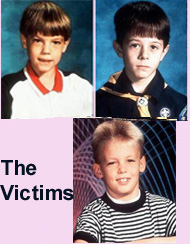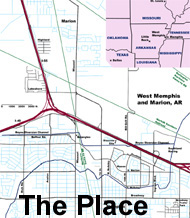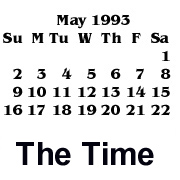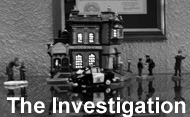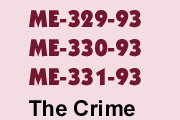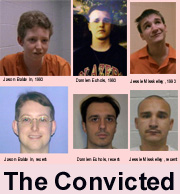Jivepuppi.com

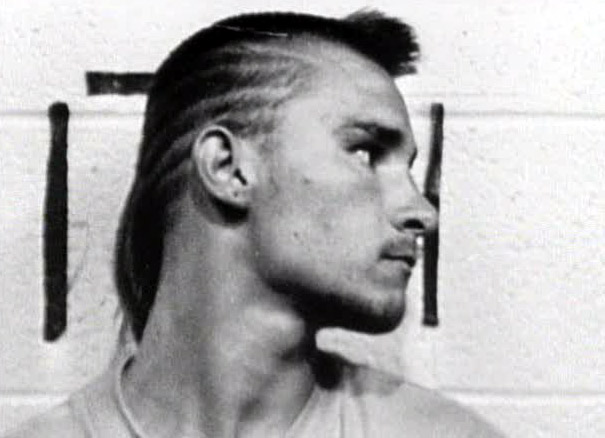
Jessie Misskelley, time of arrest.
A Twilight Kill, Part
Five: The Return of the Moon.
With a wash of sunshine across its bone-white face,
the shapeshifting moon becomes full each twenty nine days. Four weeks
had gone by since the discovery of the victims and some were concerned
the lunar passage would bring another round of murders.
Jessie Misskelley, Jr., seventeen years old sat in
the interrogation room. He had not been under suspicion, his only
previous connection to the crime had been when he and his friends
reported to the police they had been pursued by a stranger and they
were concerned he might be the killer. The stranger turned out to be
the schizophrenic son of a police officer.
After spending hours giving various and vague
stories about who might be the killers, Misskelley agreed to take a
polygraph. He was told he flunked. As was described in Blood of
Innocents, "The detectives huddled. This was it. They'd go for the
kill. They couldn't afford to miss another opportunity, not on the
afternoon of a night that promised a full moon. [Blood of Innocents,
page 168]"
They showed Misskelley a photo of the corpse of
Michael Moore. They told him this was his chance to get out. Misskelley
confessed, saying he was there at the crime, restraining Michael Moore
while Damien Echols and Jason Baldwin killed the three.
Why Misskelley confessed would be a matter of debate
with the defense citing his low IQ and claiming police coercion. What
is clear is that his taped confession was virtually free of substance
beyond what the detectives themselves stated or later claimed. As
affirmed by the Arkansas Supreme Court, only the confession linked
Misskelley to the crime.
Misskelley's rambling confession was a Rorschach
blot, the authorities desperately tried to match it to the crime. Ridge
led the charge claiming had Misskelley recounted specific details. "He
told us that is was Steven Branch that received the cuts to the face."
Misskelley said a child was cut in the face, but never identified who.
Furthermore, the autopsy photo of Moore presented to Misskelley showed
a prominent facial laceration. Ridge claimed Misskelley said they had a
cult with homosexual orgies. Misskelley said no such thing. Ridge
claimed "Misskelley also described the area where the murders occurred
very specifically." Misskelley offered no details as to the crime
scene, Ridge had described it in detail to Misskelley during the
interrogation.
Many more details were simply wrong.
Misskelley: They skipped
school.
Detective Ridge: They skipped
school?
Misskelley: They's going to
catch their bus and stuff [Misskelley taped confession, June 3, 1993]
The children didn't skip school and they didn't take
a bus to school. Misskelley described one child being choked to death.
There was no bruising or evidence of choking. Misskelley described the
victims being sodomized. There was no evidence of anal penetration.
Misskelley described the victims being tied up by rope. They were bound
by their own shoelaces. Misskelley gave various times as to when the
victims were encountered and killed ranging from before noon to "that
night." The police chose the correct time as inside knowledge.
A true believer, Ridge summed up the confession.
"We've got a story that is very, very believable. It is so close to
perfect that we have to believe it." [Interview with Terry and Angela
Grinnell, June 4, 1993] Chief Inspector Gary Gitchell, also present at
the interrogation, described the evidence against the arrested as being
an eleven on a scale of one to ten.
The confession in hand, the police made a late
evening raid, arresting Echols and Baldwin. Common practice would be to
have the supporting documents for the warrants made available to the
public. The day after the arrests, the prosecution requested the court
seal the documents, not allowing the public to learn about the paucity
of the case. The local paper lamented,
Mystery
will continue to surround the case of the three young West Memphians
found murdered last month, and the three teens accused of killing them,
in the wake of a judge's decision to close the basic documents on which
the youths' arrests were based. [snip] ...the public's questions remain
unanswered. We hope, above all else, that our faith in the law
enforcement and judicial system is justified. We just wish we knew for
sure. [West Memphis Evening Times, June 8, 1993]
Misskelley soon recanted the confession (and would
confess and recant again). All three defendants plead innocent. The
Arkansas witch trials were set to begin.
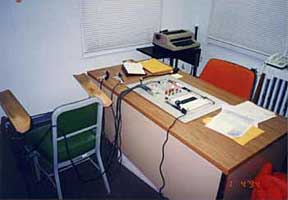
Polygraph room, West Memphis Police
Dept.
Continued in, A Twilight
Kill, Part Six: Judge David Burnett



